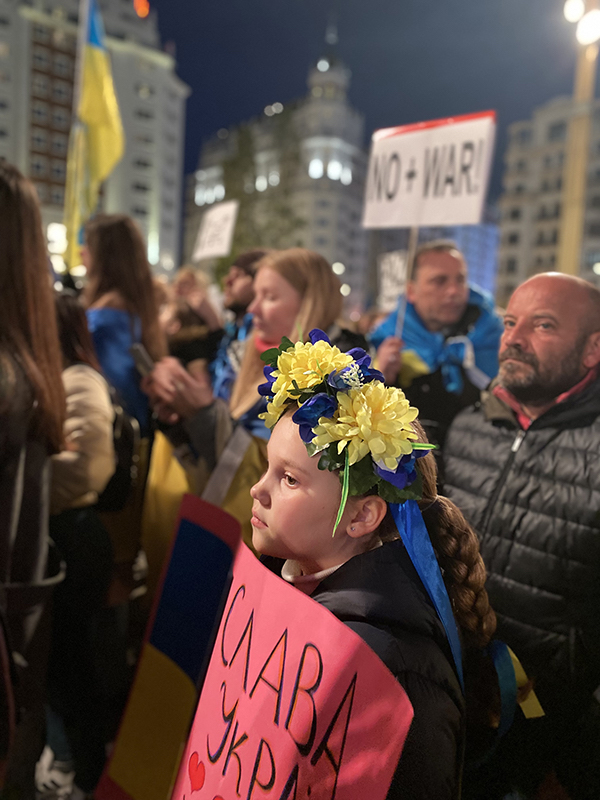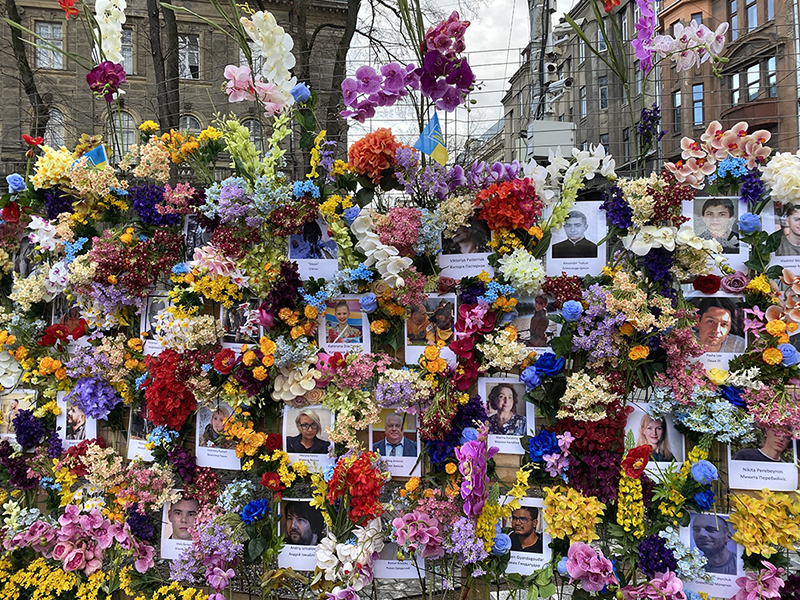Strassler Center hosts ‘The War in Ukraine Through a Camera Lens’
By Clark News and Media Relations
A Russian genocide scholar, on leave in the United States, has spearheaded a Clark University exhibition of photos documenting the war in Ukraine in defiance of Putin’s authoritarian policies prohibiting anti-war speech.
“The War in Ukraine Through a Camera Lens” is on display until fall in the Siff Gallery at the Strassler Center for Holocaust and Genocide Studies. Ten Ukrainian photographers contributed powerful images that document the daily suffering and resilience of civilians living under siege. According to Tatiana Kazakova, a Ukrainian art manager and activist based in Lviv who curated the exhibition, “Our goal is to record the events that are currently taking place in Ukraine and the price that Ukrainians pay. Our pictures are untitled, because we all became Bucha, we all became Kyiv. We have one thing in common — the war — and we must end it with common efforts.”

The Russian academic who initiated the exhibition sought to document the impact of the invasion for an American audience. The scholar has necessarily chosen to remain anonymous because of the prospect of serious personal danger. Opposition to the war is routinely punished in Russia with fines, criminal prosecution, and blacklisting that imperils livelihoods. In April, the dissident Vladimir Kara-Murza received a 25-year prison sentence for anti-war activities, a sentence widely viewed as a move to intimidate other protesters, among them ethnic minorities, religious activists, and anarchists. On the opposite side of the protesters are far-right nationalists who support the aggressive prosecution of the war and who have expressed a preference for more direct conflict with NATO and the West.
According to Mary Jane Rein, executive director of the Strassler Center, the exhibition invites viewers to consider whether the crimes committed in Ukraine constitute genocide, given reports of widespread atrocities including sexual violence, extrajudicial killings, civilian massacres, and kidnapping of Ukrainian children. Since February 2022, these crimes have unfolded against a backdrop of Russian rhetoric denying the sovereignty, history, and cultural independence of Ukraine, she notes.
For Holocaust historian Thomas Kühne, Strassler Colin Flug Professor and director of the Strassler Center, the Russian invasion is “an attempt to erase Ukrainian history and culture.” The intent to destroy a national group is key to the definition of genocide, and many scholars feel that Russian atrocities in Ukraine have reached the genocidal threshold, he said, adding that the labelling of Ukrainians as Nazis, as Putin has done, demands a response from historians challenging the perversion of history for political ends.

The Strassler exhibit features the work of photographers Andriy Chekanovsky, Anatolii Dzhygyr, Sergey Karas, Vasyl Katiman, Tatiana Kazakova, Anastasia Levko, Kateryna Mostova, Viacheslav Onyshchenko, Nelli Spirina, and Yury Tumanov. Anya Cunningham ’24, Robyn Conroy, and Alissa Duke installed the exhibition.
With no end in sight, the conflict points to the need for a deeper understanding of the region and its complex history, Rein said. To that end, the Strassler Center has invited the Ukrainian Holocaust historian Marta Havryshko to hold a three-year appointment beginning in the fall as the Dr. Thomas Zand Visiting Professor. Formerly a director of the Babyn Yar Interdisciplinary Studies Institute at the Babyn Yar Holocaust Memorial Center, Havryshko is completing a book project, “War, Power and Gender: Sexual Violence during the Holocaust in Ukraine,” that focuses on sexual violence against Jews of both genders during the Nazi occupation of Ukraine. She frequently writes and speaks about the current conflict in Ukraine. “Her presence on campus will continue to remind the Clark community of the horrors of the Russian invasion long after the photo exhibition concludes,” Rein said.









